The truth is that I’m not much interested in seeing The Fantastic Mr. Fox, a long-in-development animated film that’s based on a Roald Dahl story that Wes Anderson is (or was) planning to direct for Sony, from a script he co-wrote with Noah Baumbach. What everyone wants to see is Wes’s India movie, which I hear is written on paper and pretty damn good. (I don’t know anything else except for the locale.) The reason I’m mentioning the India flick is because plans are apparently afoot to shoot it sooner rather than later, meaning later this year or in early ’07. The India shoot appears (emphasis on the “a” word) to be scheduled to happen at the same time as Drillbit Taylor, a comedy that Stephen Brill (Little Nicky, Without a Paddle ) is going to direct for Paramount with Wes’s longtime ally Owen Wilson starring and Judd Apatow producing. It’s a bit of an either-or, art-vs.-commerce issue for Owen, who wants to do the India pic but likes the idea of Drillbit because it’s a big friggin’ payday. (Uhm, a guy who gets around just wrote in and said Drillbit Taylor “is a funny script…keep that in mind.” But I’m sure he means “funny” in a low, crude Stephen Brill kind of way.)
Indy 4 witherings
If it takes a producer longer than five years to develop a script to everyone’s satisfaction, forget it. The Gods are against the idea of it being made. And so, at this late stage in the game, is the audience when it comes to Indy 4, which has been in development since before the Gulf War. That’s because if and when it finally gets made, everyone’s guessing it’ll be about a leathery, stoop-shoulderd old coot (Harrison Ford) who doesn’t get polished apples from the cute girls in his archeology class any more. And people damn sure don’t care if Natalie Portman has been cast or not as Indy’s spirited granddaughter. I remember asking Ford about the progress of the next Indiana Jones film when I interviewed him in a San Francisco hotel room in ’94, when he was pushing Clear and Present Danger. Anyone who’s seen Firewall and watched Ford slug it out with Paul Bettany knows he’s over as an action star…the whole thing is over. Indiana Fogie!
Where’s “Edmond”?
David Mamet‘s Edmond is a harsh but fascinating film…fine… and William H. Macy is great in the title role. First Independent Pictures is opening it in New York City on 7.14. The only problem from this end is that I haven’t heard squat about any L.A. screenings or even screeners being sent out by a local publicist, whoever that might be.
Poland Hearts “Dreams”
Lord knows, David Poland usually writes from the head, but yesterday (and pretty much “out of the fuckin’ blue,” to paraphrase Chris Penn‘s Nice Guy Eddie) he wrote this really nice heart piece about Field of Dreams. I love James Earl Jones‘ “baseball has marked the time” speech; ditto the final shot of that mile-long line of cars in the distance.
Feel Night’s Pain
Feel Night’s Pain
Around 9:30 last night I started to read Michael Bamberger‘s book about M. Night Shyamalan‘s troubles in writing and directing Lady in the Water, intending only to sample a chapter or two. And I’d damn near finished the whole thing by 1:30 this morning.
“The Man Who Heard Voices: or, How M. Night Shyamalan Risked His Career on a Fairy Tale” (Gotham, 7.20) isn’t just expertly written, and it isn’t just an intimate, fascinating, inside-the-head-of-a-filmmaker saga about the making of a movie in the style of, say, Julie Salamon‘s “The Devil’s Candy.”
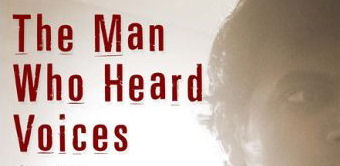
It’s a very emotional story about Night’s belief in himself as both a writer and a director, and Bamberger’s writing is such that you feel Night’s anxiety very fully as the goblins start to come out. A cut of Lady in the Water gets good numbers in a research screening at the end of the book, so there’s a happy ending or sorts, but what a grueling, lonely journey it was for Shyamalan to finally get there.
Night doesn’t come off like a petulant child in this book — not to me. He comes off as a very serious, driven and super-focused dude who deep down is feeling scared and haunted and intimidated every almost step of the way. He may seem like a prima donna to Peter Bart, but Hollywood is not about making refrigerators or selling coat-hangers, and anyone who can’t roll with insecure eccentric types who listen to spirit voices probably doesn’t belong here.
< ?php include ('/home/hollyw9/public_html/wired'); ?>
The Lady in the Water is a little bit like E.T. — about a human becoming friends with and then coming to the aid of a non-human visitor. It stars Paul Giamatti (Sideways, Cinderella Man) as an apartment-building superintendent and Bryce Dallas Howard (Manderlay, The Village) as a kind of mermaid.
The book follows Shyamalan through the writing of various drafts of his screenplay …to his breakup with Disney over Nina Jacobson, Oren Aviv and Dick Cook not getting it (which happens early on, at the end of chapter two)…to his cutting a deal with Warner Bros.’s Alan Horn and Jeff Robinov…to the location scouting and then shooting of the film…to his uncertain relationship with his erratic cinematographer Chris Doyle…to the finishing and the marketing and test-screening of the film.
I feel so closely acquainted with everything that went down that I don’t know if I can watch The Lady in the Water with any impartiality this coming Wednesday.
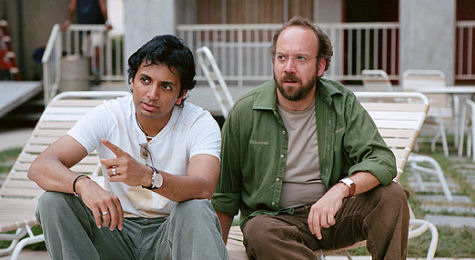
M. Night Syamalan and Ladyin the Water star Paul Giamatti
The core of the book is about Night’s certainty that he has no choice but to listen closely to voices that speak to him about creative matters as they come up (and certainly a lot more closely than to various Doubting Thomas colleagues who don’t get his script, or what he’s on about), and the very arduous process Night goes through as a result of this conviction.
It’s particularly touching in what the book implies but doesn’t quite say, which is that writing screenplays is a hellish, wandering-in-the wilderness process for some, and that Shyamalan is probably a better director than he is a writer, and that he’s also a kind of prisoner of a very rarified realm.
Night isn’t content to delight art-house audiences — he wants to reach average Joe’s in Duluth, Minnesota, and that means working in big-budget realms and with big studios and big stars, and the more money at stake the more an artist is pressured to compromise.
Here’s Bamberger describing Night’s concerns about reactions to his Lady screenplay: “He knew that if he wrote the wrong words, if he screwed the thing up, he could be viewed as a kook or worse. The forces of the industry would require him to become an assembly-line director, or retreat to the art houses, and once you’ve had a taste of feeing the masses, you don’t want to do that.”
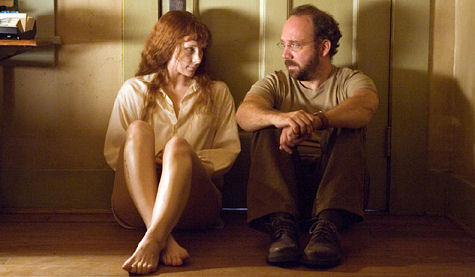
Bryce Dallas Howard, Giamatti
As Neil McCauley says to Roger Van Zandt in Heat: “Forget the money.” To hell with the legend of The Sixth Sense and the huge success of Signs (“I see green people”), and fuck the $1.5 billion Shyamalan’s films have made so far…get shut of it, shut it out.
What’s so terrible with scaling down and making movies for a somewhat smaller but hipper clientele? Night is worth about $30 million bucks, give or take…how much more does he need?
Night obviously knows that corporate Hollywood doesn’t really want to take a creative journey with anyone — it just wants the power and the glory that comes from releasing a hit. He should focus on making films close to his heart, even if it means taking a pay cut. The rest will sort itself out.
Here are some JPEGs of excerpts from the book — read them and you’ll see what I mean about the intimate tone of it. Reading them will also make it obvious to you that Bamberger is an excellent writer. I think one or two overlap, but here they are: Excerpt #1, Excerpt #2, Excerpt #3, Excerpt #4, Excerpt #5, Excerpt #6, Excerpt #7 and Excerpt #8
And if you haven’t seen Night’s American Express commercial, here it is.
A True Original
A True Original
By my own selective definition of the term, Owen Wilson is a bona fide movie star. He’s an entertaining, obviously talented actor who delivers the same personality and attitude — in film after film he plays the exact same spiritual-flotation-device spacehead — and he’s always good at it, and I’ve never tired of it and I doubt if anyone else has either.
Wilson tends to play irresponsible immature flakes, and there’s a built-in limit in playing such characters, but there is no other actor on the Hollywood landscape whose dialogue (large portions of which Wilson always seems to write or improvise himself) is focused so earnestly and consistently on matters of attitude and heart. Pretentious as it may sound, Wilson is an actor with a consistently alive and pulsing inner-ness. Is there any other actor who even flirts with this realm?
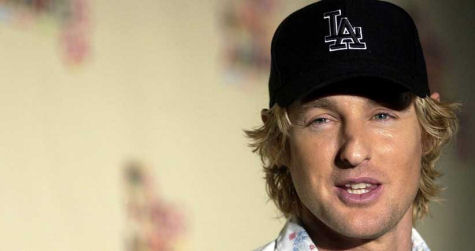
You, Me and Dupree star, producer and co-writer Owen Wilson
Stars become stars because people enjoy the fact that they do the same thing and do it well, time and again. (As Gary Cooper, Clark Gable and Cary Grant did.) Owen isn’t just Mr. Space Case, but one who really has “the spirit” — his charac- ters always seem genuinely imbued and imaginative and familiar with college philosophy basics, and there is no one else on the planet who does this sort of thing with Wilson’s particularity.
Wilson has been writing his own dialogue since forever (even in early films like Armageddon), and he doesn’t inhabit characters as much as manipulate and re-shape them in order to preach the Gospel of Owen. Wilson is nothing if not a charismatic preacher — he’s Elmer Gantry — as a clip from You, Me and Dupree called “The Mothership” proves.
< ?php include ('/home/hollyw9/public_html/wired'); ?>
This scene, by the way, is the highpoint of You, Me and Dupree — the rest of it is somewhere between sloppy and ghastly with an aura of emptiness that has to be felt to be believed. Wilson is a producer as well as costar and cowriter, and this movie is such a total comedown from The Wedding Crashers that I don’t want to think about it.
Wilson isn’t a star in the conventional sense, which is to say he’s not a romantic lead (he never lets you “in” — he’s not about manly or even childlike emotions as much as visions) and he doesn’t put arses in seats. His biggest commercial scores have always been in movies in which he plays the flaky buddy/partner of Jackie Chan or Ben Stiller or Vince Vaughn.
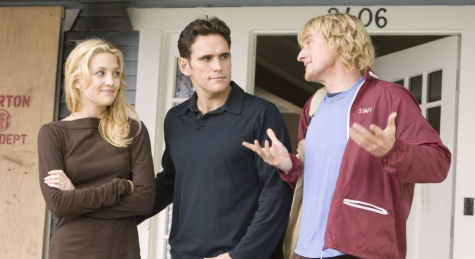
Kate Hudson, Matt Dillon, Owen Wilson in Dupree
I think it’s fair to say that Wilson’s solo turns in Behind Enemy Lines, The Big Bounce and Minus Man stopped short of seizing audiences with their primal magnetism.
The difference between Wilson and other actors who’ve become popular and rich playing best buddies is that each and every time Wilson is delivering a fine job of self-portraiture. He really and truly is Dignan in Bottle Rocket, only older, skinnier and richer with longer, expertly-cut hair.
Creatively the sky’s the limit with Owen these days, but he can’t keep playing Dupree-types for too much longer. He’ll be 40 in two and half years, and then he’ll be 45 two years after that, and the following year he’ll be 50.
In real life, brilliant funny guys are never days at the beach. It’s not in the cards. There are always demons and dark currents running within, and sometimes these manifest in behavioral tendencies that don’t merit Good Housekeeping Seals of Approval.
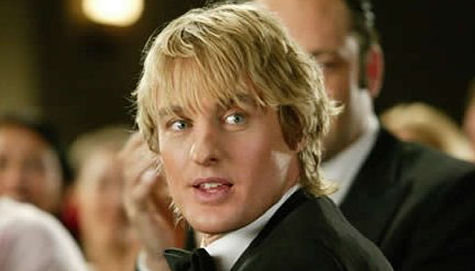
Owen is no different than Keith Moon or John Barrymore or Lenny Bruce in this regard, and it’s not a big deal. Mark Lisanti will tell you that all kinds of stories have circulated about Owen for years (and I don’t just mean the kind that support the legend of “the Butterscotch Stallion” or even that of “Owin'” Wilson — a nickname Owen picked up in the late ’90s after becoming a regular in an industry poker game) and I say “whatever” to that.
And you don’t get to be a big-time actor in this town unless you have the ability to be coldly aggressive and calculating. Naah…drop it.
I’m saying all this (and believe me, I know whereof I speak) because you will have to search far and wide for a profile of Owen Wilson that skirts the good stuff with more chickenhearted skill than the one that Rachel Abramowitz has written about Wilson in today’s L.A. Times.
I’m not quibbling with what she includes — the piece is well-written with good quotes and occasional insights. But her reluctance to deal with the meatier (colorful, curious, flamboyant) aspects of Wilson’s life is fairly staggering.
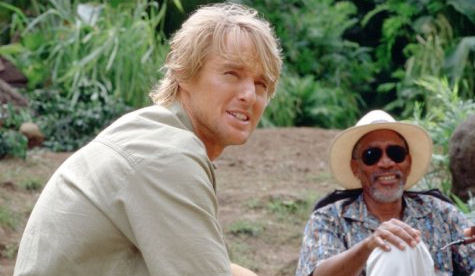
Wilson and Big Bounce costar Morgan Freeman
I’ve read Abramowitz’s piece twice, and there’s not a single line that half-seriously addresses the observations I tried to get across in the first four or five graphs of this article. And not dealing with the spiritual-philosophical current in Wilson’s work is like writing about Lou Gehrig without mentioning the fact that he played for 14 years without missing a single game.
Her piece is yet another example of the studied-Valentine style of celebrity profiles that you always get in the L.A. Times — the kind that exude smarts and flirtatious- ness and a semblance of insider authority, but which basically blows smoke up the reader’s ass.
I liked one paragraph — the one about Bottle Rocket producer Polly Platt going into a church during the tumultuous editing of that film in ’95. “I looked over to my left and Owen was in the same church praying,” Platt tells Abramowitz. “That’s the only indication I had that he was suffering.”
About Andrew Wilson
And New York Post writer Sara Stewart offers a cursory meandering examination of the life and career of Andrew Wilson, the amiable, sharp-minded and extremely focused 41 year-old older brother of Owen and Luke Wilson.
Andrew’s been acting since the Bottle Rocket days, but Stewart barely says a word about Andrew’s co-direction (with Luke) of The Wendell Baker Story, an unusual, agreeably quirky dramedy about mood and attitude and Texas weirdness. Andrew let me see Baker a little more than a year ago (I wanted to screen it at that UCLA “Sneak Previews” thing I was moderating), and while it has some issues they’re far from fatal afflictions, and it sure as shit doesn’t deserve to be wallowing in near-total obscurity without any kind of distribution deal.
I guess Stewart’s article (which features insights from David Poland) is mainly about the burdens of being the “other” brother.
The piece has a couple of speed-bumps: (a) it gives Owen’s age as 38, and yet the IMDB says he’ll be 37 until 11.18.06, and (b) Stewart quotes Kurt Hale, director of a barely-seen movie called Church Ball that Andrew costarred in, as saying that “if you close your eyes and listen to [Andrew], he sounds exactly like Owen,” which is misleading and poorly put. Andrew tends to express thoughts with the same kind of imaginative attitude and gut-level insight that Owen is known for, but his voice is deeper and not even vaguely similar to his younger brother’s.
Saturday “Pirate” biz
Pirates 2 did just shy of $44 million on Saturday. Add that to Friday’s increased estimate of $55 million (that $52.8 million estimate I ran yesterday has since been adjusted) and you’re looking at just under $100 million after two full days. What will happen today (Sunday, 7.9)? The ballpark figure will almost certainly be somewhere between $35 and $40 million (Sundays are always a bit weaker than Saturdays) so the three-day total…well, do the math. (The other guys are predicting $32 million and change.) Superman Returns took in a piddly $8.4 million yesterday, and is expected to wind up with about $22,800,000 by late tonight. Next week it’ll wind up with $13 or $14 million and that’ll be that. (But watch the IMAX screenings hang in there.) The Devil Wears Prada is expected to end up with about $15,069,000 by late tonight. And you don’t care that much about the rest.
U-Tube Auditions
Saturday U-Tube Funnies: Kevin Spacey-as-Chris Walken auditioning to play Han Solo (and it’s a little stilted…Spacey is good but not great). Video also has Richard Dreyfuss auditioning to play 3CPO, and Walter Matthau reading…blah, blah.
Food-Wine Movies
A 7.9 N.Y. Times piece by Steve Chagollan eyeballs a fresh crop of U.S.-produced foodie and wine-sipping movies — Ridley Scott‘s A Good Year (with Russell Crowe) and Scott Hicks‘ Mostly Martha remake (with Catherine Zeta-Jones), plus a forthcoming adaptation of Anthony Capella‘s The Food of Love by director Peter Chelsom (Shall We Dance?) and an adaptation-in-the-works of Julia Child‘s “Mastering the Art of French Cooking” from director-writer Nora Ephron. And…wait, there’s more.
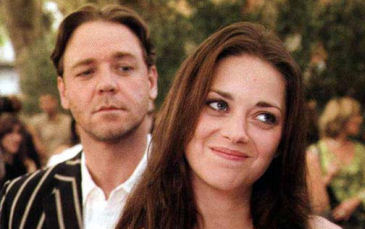
Chagollan’s conclusion is that these films may be happening because of (a) greater longings for comfort and (b) changing notions of male virility and sexuality. “Food is that thing that people retreat to for comfort and safety,” CAA agent Lisa Shotland tells Chagollan, “and in these uncertain times that just becomes more and more the norm.” And producer Denise Di Novi observes that the chef has become “the new rock star…the qualities that make a man sexy have expanded beyond traditional male roles, [and] great chefs embody the things that make all great artists appealing, in that they’re creative, committed and passionate.”
Shyamalan vs. critics
On her Risky Biz blog, Anne Thompson is reporting how director M. Night Shyamalan “mauls a nasty film critic named Harry Farber (played by Bob Balaban) in Lady in the Water. Is it veteran critic Manny Farber? Or the still-reviewing Stephen Farber? ‘It’s one person’s concept of what a film critic is like,” said one critic who saw an early Lady in the Water screening. ‘It’s a funny character, and it dovetails with the popular conception of effete snide film critics.’ According to Farber, who hasn’t seen the film, ‘I don’t think I ever wrote much about his movies, except to say that Unbreakable was actually more interesting than The Sixth Sense up until the absurd ending. I was comparing the endings of the two movies. I never wrote about Signs and never even saw The Village. So if I am the target of his ire, I’d hate to think where that would put critics who actually slammed those two movies!'” Does anyone remember the “General Kael” character in George Lucas‘s Willow?
How’s Digg doing?
Just wondering how many HE readers check movie stories on Digg.com. Dan Mitchell has a N.Y. Times piece up today about how Digg is driving readers to stories. Anyone can submit a story, after which readers “vote” on its popularity orintrigue-levels by clicking on it.

